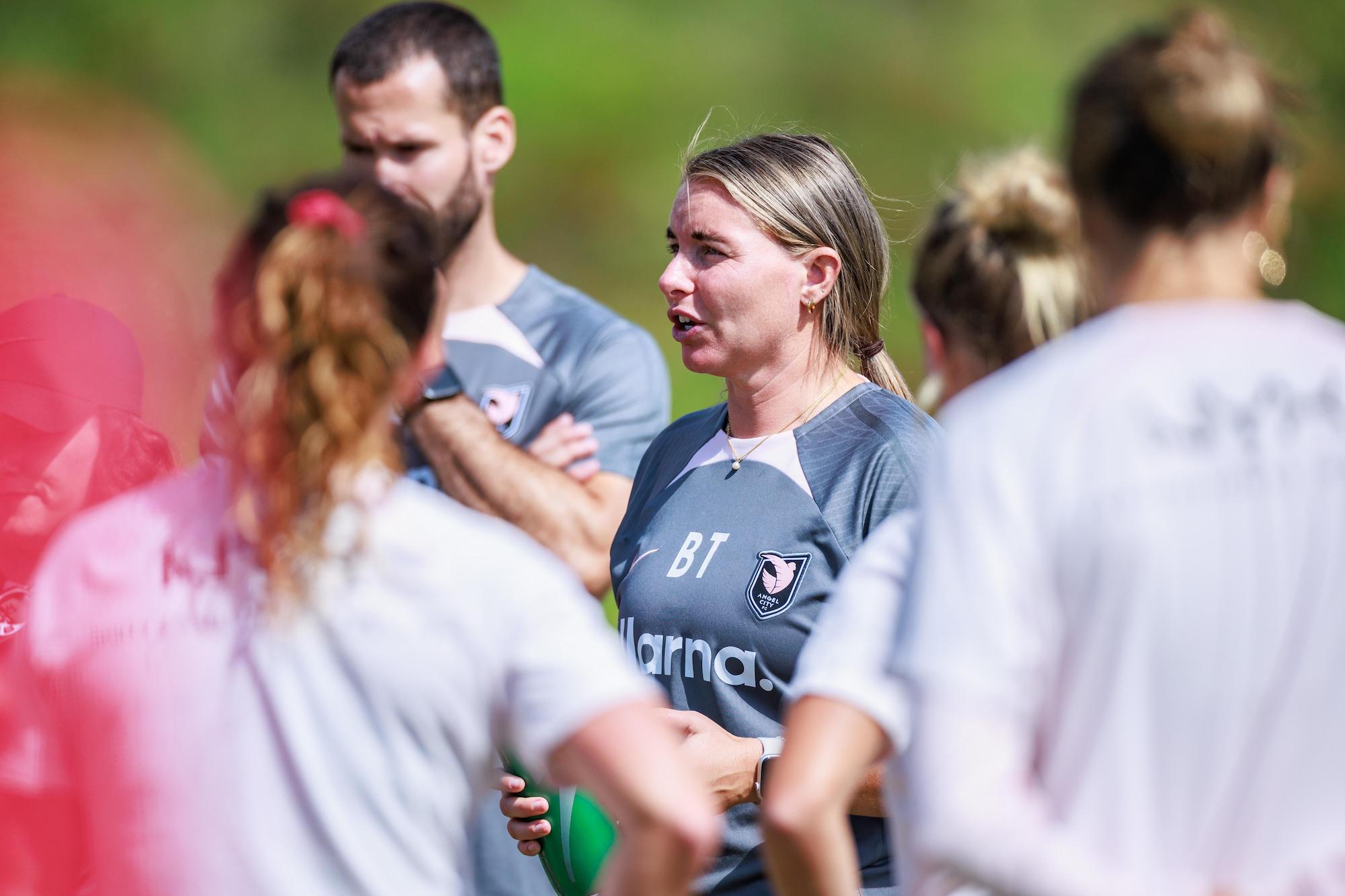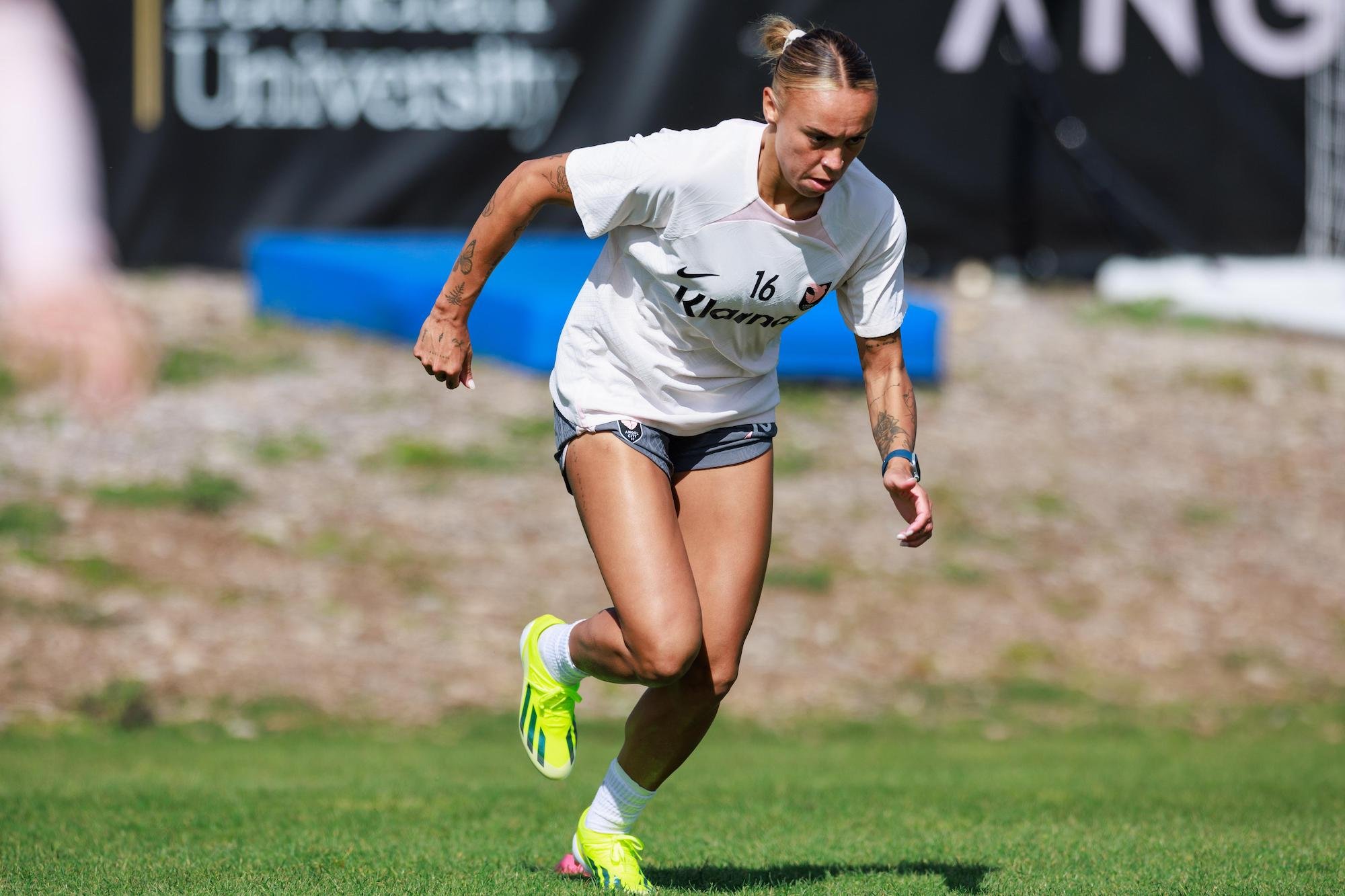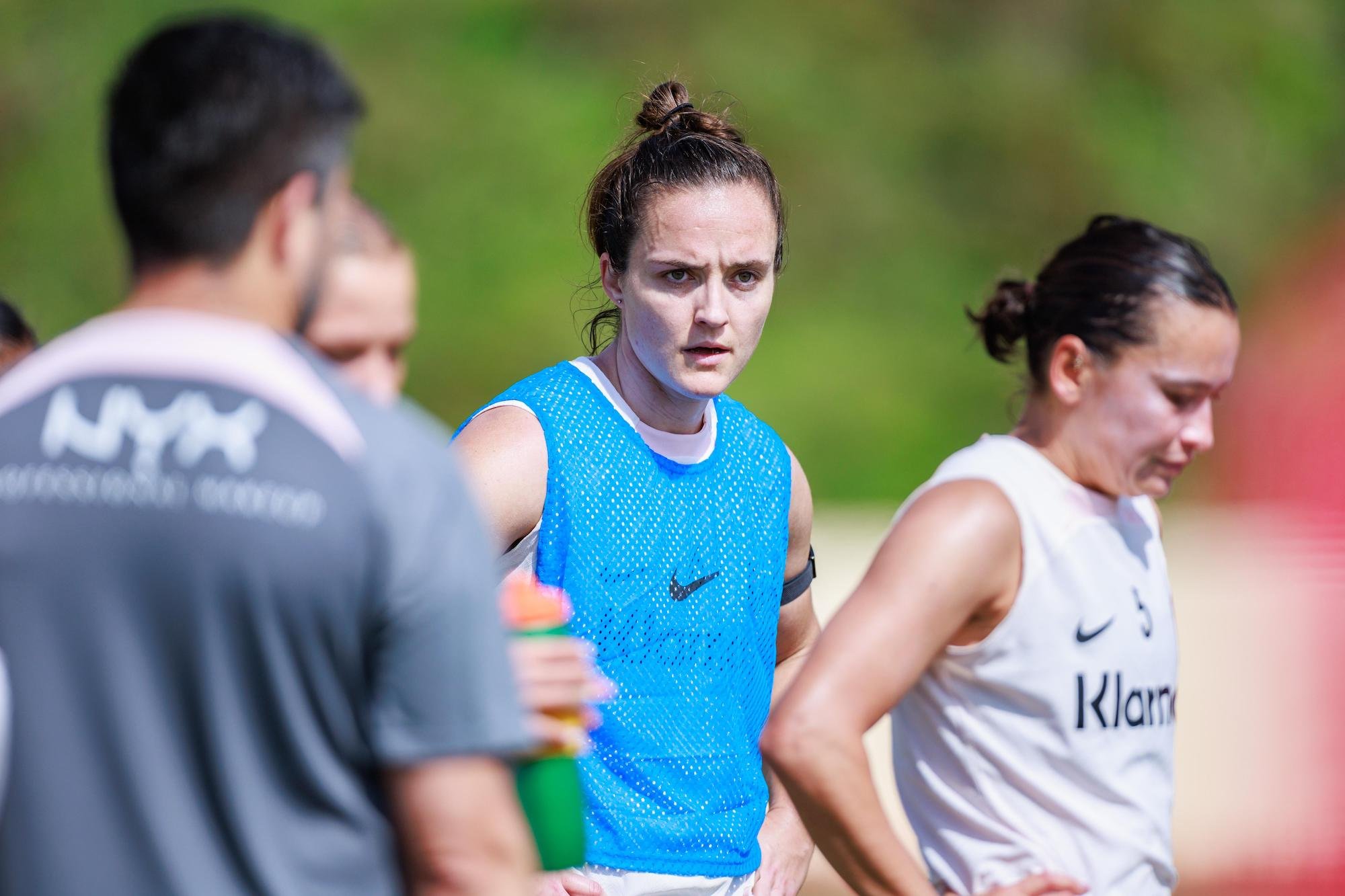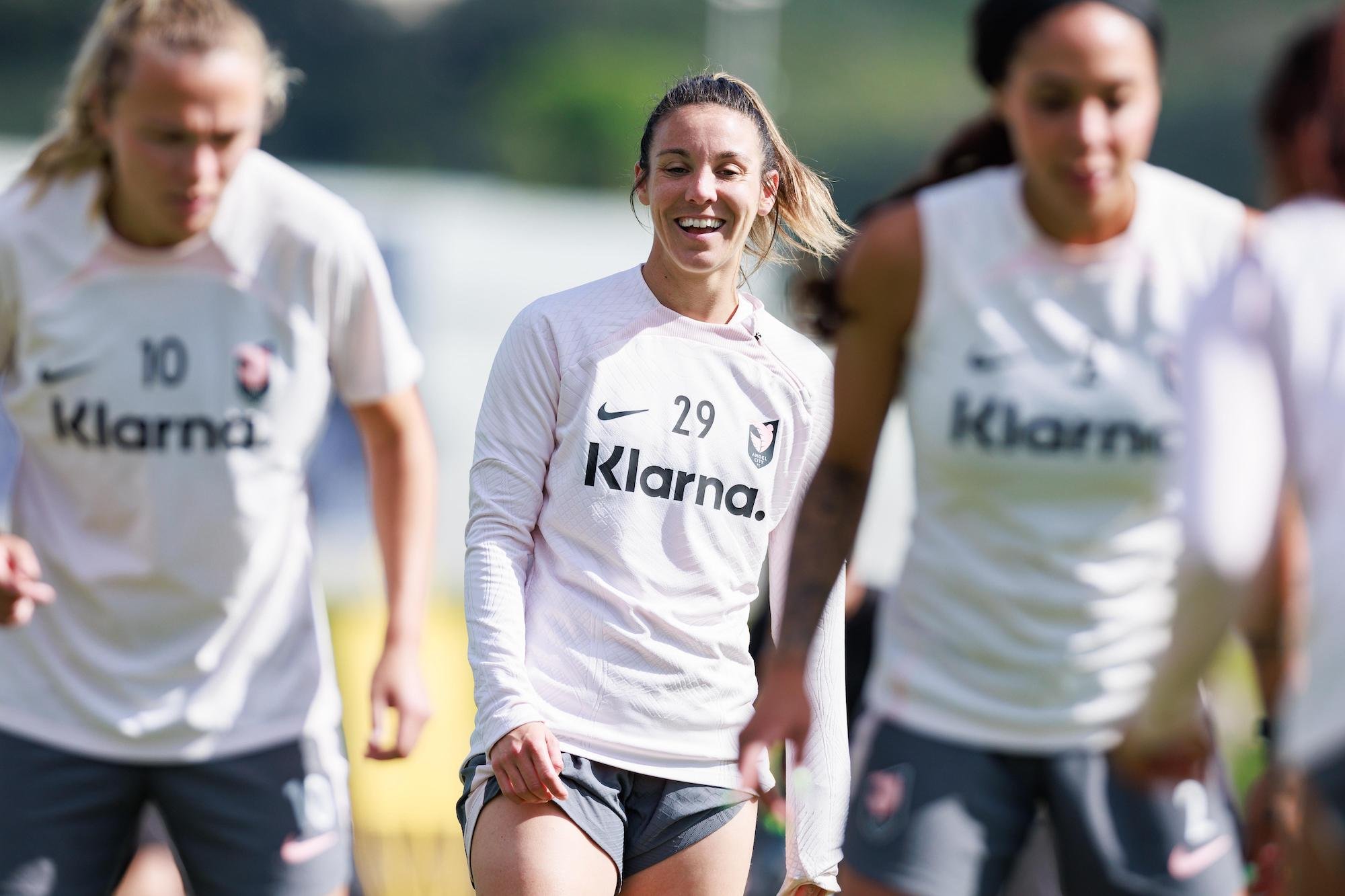
A soccer team is a deeply complex entity. It consists of 26 individuals, all with different skills and physical capabilities, age and experience levels, and mental and emotional abilities and needs. For a coaching staff, the output on game day—a certain lineup in a certain formation with a certain plan—is the tip of an iceberg that consists of far more than the Xs and Os on the field.
The underwater part of the iceberg, the part you don’t see on the field, is the many more hours spent on the training field, in the film room, on the recovery table, and in the downtime the group spends together—and the collective values, goals, and relationships built during those hours.
Anyone who’s been in the sport long will tell you that those elements of a team’s identity are at least as important as the way it presses or who makes the starting lineup. They’ll also tell you that it takes years of hard work to build that identity, with lots of trial and error and hardship along the way. As Angel City heads into its third season, the club’s culture and identity are beginning to solidify, and that’s paying off.
“Team culture,” defined
Plenty of ink has been spilled, both within sports and elsewhere, on the importance of a strong team culture and how leaders can cultivate it. For Head Coach Becki Tweed, it’s a term that’s been thrown around so much it’s become almost meaningless.
“I actually think the word ‘culture’ is really overused,” she says. “Everybody says, ‘we want to create a positive culture,’ but I think actually, you have to know the people that are in your environment. Every culture or every environment is different.”
In other words, for Tweed and her staff, rather than aiming for some abstract ideal of a positive culture, it’s about recognizing what their specific group needs and cultivating that, something she says is a skill in its own right.
But while she rejects the idea of a one-size-fits-all approach to team culture, when she talks about building a positive environment, a few simple, foundational values emerge—things like respect, trust, and honesty. It’s only with those values in place that the authentic relationships that carry a team through adversity can be built.
Multiple players echo the sentiment that strong relationships are the bedrock of a successful team. “I think it’s one of the most important things,” says forward Sydney Leroux. “You play on a team for those relationships, because you need everybody. You're only as strong as you are as a group. If you’re not, things break down really fast.”
“You can have really good players in a team, and things don’t come together because everyone is so focused on themselves,” adds defender M.A. Vignola. “I've always been huge on your team being like your second family. The closer that you are, the better that you're going to play, because you want to fight for each other.”

A delicate balance
Loss, failure, and disappointment are unavoidable facts both of life and sport. Some players on any professional team will always be cut, transferred, or traded; on game day, only 11 of them get to step onto the field. For a coach, balancing those harsh realities with care for their players, which is crucial to building a cohesive team, is a challenge.
“You're never going to be able to please everybody as a coach,” says Tweed. “I think the biggest thing that I've found is people really value honesty, transparency, and feedback—and feeling like they're kept honest and held accountable.”
Although the needs of the team as a whole are always the priority, carving out space for every player on the roster to grow as an individual is also crucial. That obviously lifts the level of the whole group, while also ensuring players feel seen and valued.
“We talk about team-first mentality, which is key,” says the coach. “But to get a team-first mentality, individuals have to be performing and pulling other people with them.”
Another piece to the puzzle is making it clear that all 26 players on the roster are important contributors, whether or not they start on gameday. “Everybody wants to play, and everybody wants to be part of something, and feel like they can contribute,” says Tweed. “We tend to equate value to playing time, but value is actually about the impact that you can make on the team. Your impact can be on game day, it can be off the field, it can be in training. There are so many ways to impact a team in an environment that don't boil down to game day.”
Finally, there’s an axiom Tweed has emphasized throughout her tenure as head coach: competition is key. That’s about cultivating a tough, get-it-done attitude in trainings and games, but it’s also literal. No one on the Angel City roster is guaranteed a starting spot, and anyone can make the XI on a given weekend if they show they deserve it during the week. That gives every player something to work towards each day.
“We understand disappointment,” she says of her coaching staff. “We understand that not making [the starting lineup] is difficult. But we also talk about opportunity a lot, and how it’s always going to come around. The season is long and you have to wait for your moment to be called on sometimes.”

Grit, joy, together
Asked to describe Angel City’s specific team culture, defender Sarah Gorden doesn’t hesitate. “We're a gritty team. We play with heart and passion,” she begins. “But it’s also about playing with joy and happiness.”
Those two themes—determination, tenacity, and grit; versus joy, levity, and fun—come up again and again around the team. Far from be ing opposites, they’re necessary complements, each making the other possible.
The determination side of the coin was much discussed last year, as the team fought their way into the playoffs after falling to 11th place by the halfway point of the season. “Everything kind of came together and we really found who we were as a group,” remembers Gorden. The coaching staff were a big part of cultivating a winning culture, but she also credits “just being a group of passionate women and being at that point in the season [last year] and looking in the mirror and being like, ‘who are we?’”
The importance of grit is perhaps most obvious in games: amid the toughest competition in the world, if a team isn’t fully switched on for 90 minutes plus stoppage time, they’re going to drop points.
Another facet, though, is much more quotidian: do players come to every training with the attitude that they and their teammates can grow through adversity? Are they comfortable holding each other accountable, and being held accountable themselves?
“We're serious about what we do,” says defender Megan Reid. “We are professionals and we are very intentional in everything. I think that's something that's really cool is knowing what we're being held to, so that we don’t even need [the coaching staff] to correct things. We know if we're not performing at the level that we need to be, and we can demand it from one another. If I'm going to be the first one to pat you on the back for doing something well, I should also be able to demand more from you, and vice versa.”
That kind of seriousness can’t exist in a vacuum, though. At the end of the day, everyone comes to soccer for the same reason: it’s fun.
“This should be fun,” says Tweed. “It’s tiring, and you put your body through a lot, and you put your mental state through a lot. But ultimately, showing up every day and knowing that you're going to laugh a lot is something that drives people forward—staff and players.”

“We have a lot of fun together,” adds Leroux. “You know, we’re getting into our TikTok era. All these young kids coming in, showing us the way, showing us what's cool, but then we're like, ‘oh no, that was cool like, 20 years ago, and now it's coming back.’”
Tweed gives an example: “I walked out into the field the other day, and the entire team has got Scottish music on, and Claire [Emslie] is teaching them a dance,” she laughs.
Both of those qualities—strength and joy, toughness and laughter—rely on the team’s togetherness.
“It’s really important to create a culture that welcomes everybody in, and where we see each other for more than just the athletes that we are,” says Vignola. “We’ve done a lot of team bonding things where we’ve learned about each other as people, and you’re like, ‘oh, that's cool. I didn't really know that you've been through those experiences,’ and you get a better understanding of each other. It’s just about being kind-hearted and in this flow every day.”
“When you sit in a room with this group of people and you look around at the age range, the languages, the different cultures, this group is so special,” says Tweed. “It doesn't matter what your beliefs are, what your differences are.
We’re all here for the same purpose, and you respect how your teammates are different to you, but you want to know about them. Those are the things that separate teams. When things get hard, you can always fall back on the person that you are and know that the people around you are supporting you for who you are.”
Building for now, building for the future
None of this happens overnight. “It takes years and years to build a culture and to have a club have an identity,” says Gorden. “I think the past few years, everyone's done a great job of finding that identity, and now we’re continuing to build on it.”
In addition to the coaches, a strong culture requires leadership from within the team, starting with veterans like Gordon and Leroux.
“I think about my career and the people who helped me,” says Leroux. “Now that I'm a veteran player, all I want to do is make sure that everyone is good, because, especially as a rookie or a younger player, it's tough. What we do is hard. So I think as veteran players, we’ve just got to make sure that we're there for them.”
Defender Merritt Mathias—who is finally returning to the field after spending her first year at Angel City sidelined with an injury—sees building a culture as an important part of her role. “Part of why I was excited to come to Angel City last year is that this is something new,” she says. “And it's like, ‘how do I bring who I am and how do I impact this environment or this organization long past my playing days?”
At the end of the day, a team is made up of people, and it’s only by recognizing what unique contributions each of those people offers that a team can be successful.
“This group is a special group of people,” says Tweed. “We want to transfer that onto the field and show that we can be a championship contender.”

